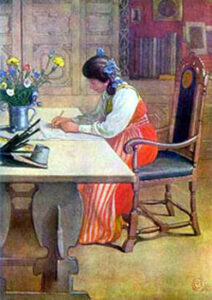Reflections ~ by Mike Baumstark

Each of us are linked to the past through our parents, grandparents, great grandparents, and so on, as far back as we can trace, and beyond. Our values, attitudes and views are, in a large part, flavored by our heritage, coupled with our many life experiences. Each experience or interaction we have with another people, adds to our individual makeup. We react to these experiences based on what we have learned about ourselves and the world to this point. Think of the learning process as a huge computer database. We have in that database the things which we are born with. As we age, we continue to add experiences, impressions, and events to that base of information. With each new addition, the database automatically changes. Sometimes the change is slight, sometimes it is significant, depending on the input, but always it changes. Our database continues to change throughout our life and is the basis for the way we view life and the memories we have. Some of the memories will be good and some painful perhaps, but these memories affect the way you approach life.
The human resource is renewable but the memories and lessons learned by individual generations are fragile. Shared and given freely to others, we keep memories alive long after we are gone. Kept to ourselves, memories wither and are lost forever. In the past, the art of storytelling was a way of life. Through storytellers, the history of the tribe or family was made secure for another generation. So important was this gift that the storyteller was given a special place of honor in the tribe, serving as an important link between generations to keep the history and lore of the tribe alive.
In our modern society, the art of storytelling is still alive and well. A good storyteller can still hold an audience captivated and bring a smile to the face or a tear to the eye with the twist of a word or the turn of a phrase. Our modern storytellers are ministers, politicians, teachers, lawyers, standup comics, authors or anyone else whose job it is to relate a message, convince or entertain with the spoken word. The power to summon up visual images of places and events with the spoken word has always been a powerful tool and something that can transcend barriers of age and time to connect one generation with another.
If you fashion some experience, real or imagined, into a story and relate that story to another human being through the written or spoken word, you are a storyteller and a member of a very prestigious group. If you pass that story on to your children or grandchildren, then you are assuring your immortality through the next generation and you will have given their minds food for thought and a connection with the past on which to build their future.
For example, do you remember life before central air and heat, color television or private phone lines? When houses had 10 foot ceilings, big windows in every room, a coal furnace and in the front yard there stood a large oak tree with a rope swing attached? Like some families, yours had a solid black dog named Spot, a orange and white striped cat called PQX, a parakeet named Piccolo Pete and your best friend lived two houses away and walked to school with you every day.
Remember when houses had “real” front porches? Remember how your parents would sit on the front porch swing in the summer while the kids played hide-and-seek? As you got older, you shared the front porch swing with someone special, holding hands and sharing dreams. It was an unhurried time, a time when we actually knew our neighbors on a first name basis and the term “neighborhood” meant more than just a geographic location. It was a time when families sat down together at the dining room table for a leisurely meal and caught up on events affecting the family.
Remember when the pace of life included time for a Sunday afternoon drive with the family in the family car, picnics, a visit to the zoo or the regular weekend stop at grandmother’s house for supper? It was a more relaxed time, before there was a computer in every house and a color television in every child’s room. It was a time before satellite dishes, cable TV, the shopping channel, superhighways, computer viruses or killer bees. Well, I remember, and I think you probably do too.
I urge you to take the time to share your experiences with others. If you want the history of your community or family left to the interpretations of someone else, then simply do nothing. Someone else will interpret, for future generations how you felt, how you viewed the world, what you thought and what contributions you made. Those interpretations, values, and views of your world will be passed on to future generations and those will become the heritage of your children and grandchildren. It is important for you to remember that recorded history, as we know it, is only the memories of someone who took the time to write them down.
Write down or record your memories, talk about what happened during your lifetime. Give future generations a taste of the past so they can better prepare and evaluate events of the future. Many community and county historical societies have programs to verbally record local history. I hope you will check on the availability of these programs. If there isn’t a program in your area, encourage someone to start one. It was once said, “If we do not learn from the past, we are doomed to repeat it.” It is equally true that if we can learn from the past, we will be better prepared to face the future.
If you would like to contact someone who can tell you more about how to become involved in recording your memories, contact: